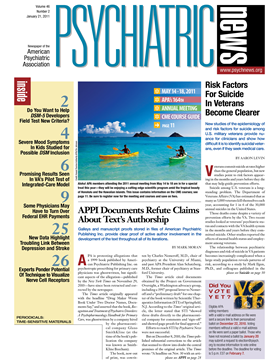A survey of 246 lesbian, gay, bisexual, and transgendered (LGBT) youth in Chicago found the prevalence of mental disorders to be similar to that of other samples of urban or minority youth but higher than national youth population samples, according to a study published in the December 2010 American Journal of Public Health.
The researchers used the Diagnostic Interview Schedule for Children to assess rates of posttraumatic stress disorder (PTSD), anorexia, bulimia, major depression, conduct disorder, and suicidality. They also used the Brief Symptom Inventory to measure psychological distress in their study sample.
Participants were youth aged 16 to 20 living in the Chicago area. They were recruited by advertisements and flyers or brought in by other study participants. Most were members of racial or ethnic minorities. About 57 percent were black, 11 percent were Hispanic, and 14 percent were white. (No racial breakdown was given for Hispanics.)
One-third of participants met criteria for at least one psychiatric diagnosis, noted study authors Brian Mustanski, Ph.D., Robert Garofalo, M.D., M.P.H., and Erin Emerson, M.A. Mustanski is an assistant professor of psychiatry and director of the IMPACT program at the University of Illinois at Chicago. Emerson is a research data analyst there. Garofalo is an associate professor of pediatrics at the Northwestern University Feinberg School of Medicine.
About 15 percent met criteria for major depression, 9 percent for PTSD, and 15 percent for suicidal ideation. The authors said in their report that their results are roughly comparable to other epidemiological findings about sexual minorities, after considering differences in survey populations and methodology.
“[O]ur findings do not generally support the hypothesis of increased psychiatric morbidity resulting from additive or multiplicative social adversity that may be faced by individuals who are both racial/ethnic minorities and sexual minorities,” they wrote. However, the study lacked a control group and used nonrandom sampling, they noted.
Those factors prevent generalization about the findings, said Ellen Haller, M.D., a professor of clinical psychiatry and director of the residency training program at the University of California, San Francisco Department of Psychiatry. Haller is a former chair of the APA Committee on Lesbian, Gay, and Bisexual Issues. She was not involved in the study.
“It's wonderful to include such a high proportion of racial and ethnic minorities, because this is an understudied population,” said Haller in an interview. She noted, however, that the survey results can't be compared with the results of surveys of white, rural populations because, for example, LGBT youth are less willing to self-identify in surveys due to stigma.
Racial and ethnic minority youth in the survey generally had no more mental disorders than did white respondents, with one exception. Minority youth were more likely to have conduct disorder than white respondents were.
“However, the study included no straight kids from similar backgrounds,” Haller pointed out. “Would the high rate of conduct disorder occur in a sample of straight kids with similar ethnic or geographic backgrounds?”
The differences from previous studies may hint at changes within U.S. society, suggested the authors.
Earlier studies on adolescents, or those focusing on adults, “may no longer reflect the current relationships between sexual orientation and mental health among youth,” especially in light of society's changing views of LGBT people, they said.
One surprise to the researchers was that participants who identified themselves as bisexual reported lower rates of any mental health diagnosis and of lifetime suicide attempts than other study participants did.
Lower than expected rates of problems among self-identified bisexuals may reflect a reticence of some bisexuals to identify themselves as such, said Haller.
These individuals are often discriminated against twice, she said. Lesbians and gays see bisexuals as unwilling to assert a fully different sexuality even as the general society stigmatizes them as gay. Furthermore, they are often perceived as “promiscuous” by both gays and straights, increasing the prejudice they encounter.
Whatever its limitations, the study helps fill a need for increased research into mental health issues faced by members of the LGBT community, Haller said.
“In the last decade there have been more large, population-based, epidemiological studies carried out for other purposes but that included questions about sexual orientation or sexual activity,” said Haller. “These have helped better quantify rates of mental illness, generally showing slightly increased rates.”
The problem is that different surveys used different terminology and measurements, so it's hard to compare them.
“Some surveys may ask about sexual activity but not whether respondents self-identify as gay,” she said. “But every single adolescent who opens up and discusses his or her sexual orientation faces a risk of abuse or rejection, so it's important to get these questions routinely included in surveys.”
